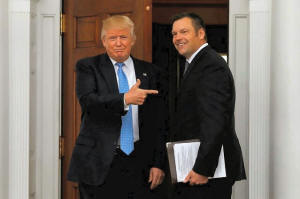|
States refuse Trump commission request
for U.S. voter data
 Send a link to a friend
Send a link to a friend
 [July 01, 2017]
By Chris Kenning [July 01, 2017]
By Chris Kenning
CHICAGO (Reuters) - A growing number of
U.S. states refused on Friday to give voters' names, addresses and
sensitive personal information to a commission created by President
Donald Trump to investigate alleged voter fraud, saying the demand was
unnecessary and violated privacy.
"This commission was formed to try to find basis for the lie that
President Trump put forward that has no foundation," Kentucky Secretary
of State Alison Lundergan Grimes told Reuters in an interview.
Republican Trump has made unsubstantiated claims that millions of people
voted illegally for his Democratic rival Hillary Clinton in the 2016
election. He established the panel by executive order in May despite
evidence that voter fraud was not widespread.

Trump's Presidential Advisory Commission on Election Integrity sent a
letter to all 50 states on Wednesday asking them to turn over voter
information including names, the last four digits of social security
numbers, addresses, birth dates, political affiliation, felony
convictions and voting histories.
The request from commission Vice Chairman Kris Kobach caused a backlash
in states including Virginia, Kentucky, California, New York and
Massachusetts, where election officials said they would not provide all
the data.
California Secretary of State Alex Padilla said on Thursday that handing
over information would only serve to legitimize debunked claims of
widespread voter fraud.
More than 20 states said they would not or could not provide some or all
of the information requested, according to statements from election
officials and media reports.
Some said certain data such as social security numbers were not publicly
available and that they would turn over only public information. Others
raised privacy concerns or questioned the need to examine voter fraud.
Mississippi Secretary of State Delbert Hosemann said in a statement that
he had not seen the letter but would rebuff the commission.
"They can go jump in the Gulf of Mexico and Mississippi is a great state
to launch from," he said.
[to top of second column] |

President-elect Donald Trump stands with Kansas Secretary of State
Kris Kobach before their meeting at Trump National Golf Club in
Bedminster, New Jersey, U.S., on November 20, 2016. REUTERS/Mike
Segar/File Photo

Kobach, the secretary of state for Kansas, has been a high-profile
advocate of tougher laws on immigration and voter identification.
His office did not respond to Reuters requests for comment.
Kobach was quoted in a Kansas City Star article as saying that his
own state would not provide social security numbers at this time
since they are not publicly available. Kobach did not rule out
providing that information in the future.
In his letter, a copy of which was provided to Reuters by the
Connecticut Secretary of State's office, Kobach also asked states
for feedback on how to improve election integrity and for evidence
of voter fraud and convictions of voter-related crimes since 2000.
Civil rights groups and Democratic lawmakers have called the
commission a tactic to suppress votes against Republicans.
"States are right to balk at turning over massive reams of personal
information in what clearly is a campaign to suppress the vote,"
Dale Ho, director of the American Civil Liberties Union Voting
Rights Project, said in a statement on Friday.

While the public availability of voter data varies by state, the
request raises privacy concerns, said Richard Hasen, a University of
California, Irvine, professor who studies election law.
(Reporting by Chris Kenning; Editing by Ben Klayman and Grant
McCool)
[© 2017 Thomson Reuters. All rights
reserved.]
Copyright 2017 Reuters. All rights reserved. This material may not be published,
broadcast, rewritten or redistributed. |